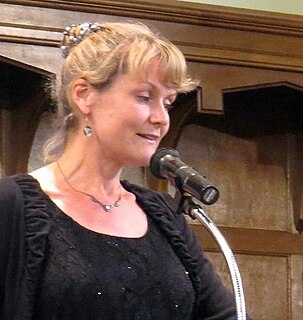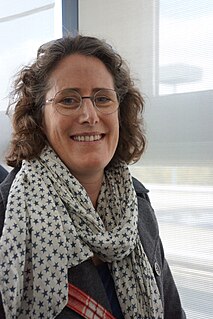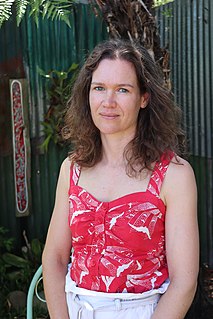Related Research Articles

William Manhire is a New Zealand poet, short story writer, emeritus professor, and New Zealand's inaugural Poet Laureate (1997–1998). He founded New Zealand's first creative writing course at Victoria University of Wellington in 1975, and has been a strong promoter of New Zealand literature and poetry throughout his career. Many of New Zealand's leading writers graduated from his course. He has received many notable awards including a Prime Minister's Award for Literary Achievement in 2007 and an Arts Foundation Icon Award in 2018.
Kate Duignan is a New Zealand novelist, short-story writer, reviewer and teacher.

Charles Orwell Brasch was a New Zealand poet, literary editor and arts patron. He was the founding editor of the literary journal Landfall, and through his 20 years of editing the journal, had a significant impact on the development of a literary and artistic culture in New Zealand. His poetry continues to be published in anthologies today, and he provided substantial philanthropic support to the arts in New Zealand, including by establishing the Robert Burns Fellowship, the Frances Hodgkins Fellowship and the Mozart Fellowship at the University of Otago, by providing financial support to New Zealand writers and artists during his lifetime, and by bequeathing his extensive collection of books and artwork in his will to the Hocken Library and the University of Otago.
Jack Ross, is a New Zealand poet, novelist, translator, editor and lecturer in creative writing. A trilogy of novels has been published by two different publishers, Alan Brunton's Bumper Books and Titus Books.
Michael James Terence Morrissey is a New Zealand poet, short story writer, novelist, editor, feature article writer, book reviewer and columnist. He is the author of thirteen volumes of poetry, two collections of short stories, a memoir, two stage plays and four novels and he has edited five other books.
Leigh Robert Davis was a New Zealand-based writer who created long poems and large-scale, mixed-media projects in which he worked with painters, designers and composers. He was known for the highly experimental nature of his creative work.
Sarah Quigley is a New Zealand-born writer.

Emma Neale is a novelist and poet from New Zealand.

Kate Camp is a New Zealand poet and author who currently resides in Wellington.
Kay McKenzie Cooke is a poet from New Zealand.

Airini Beautrais is a poet and short-story writer from New Zealand.
Carolyn McCurdie is a British-born New Zealand author.
Jillian Sullivan is a writer of fiction, non-fiction, and poetry and a creative writing teacher. Her work has been published in New Zealand and overseas.
Ashleigh Young is a poet, essayist, editor and creative writing teacher. She received the Windham-Campbell Literature Prize in 2017 for her second book, a collection of personal essays titled Can You Tolerate This? which also won the Royal Society Te Apārangi Award for General Non-Fiction. She lives in Wellington, New Zealand.
The Kathleen Grattan Award is one of New Zealand’s top poetry awards. It is named after Kathleen Grattan, an Auckland poet, who died in 1990. The award was first made in 2008.

Michael Harlow is a poet, publisher, editor and librettist. A recipient of the Katherine Mansfield Menton Fellowship (1986) and the University of Otago Robert Burns Fellowship (2009), he has twice been a poetry finalist in the New Zealand Book Awards. In 2018 he was awarded the Prime Minister's Award for Literary Achievement, alongside playwright Renée and critic and curator Wystan Curnow Harlow has published 12 books of poetry and one book on writing poetry.

David Howard is a New Zealand poet, writer and editor. His works have been widely published and translated into a variety of European languages. Howard was the co-founder of the literary magazine takahē in 1989 and the Canterbury Poets Collective in 1990. In New Zealand he held the Robert Burns Fellowship at the University of Otago in Dunedin in 2013, the Otago Wallace Residency, in Auckland in 2014, and the Ursula Bethell Residency in Christchurch, in 2016. In more recent years he has been the recipient of a number of UNESCO City of Literature Residencies.
Rachel Bush was a New Zealand poet and teacher. Her work was widely published in books, anthologies and literary magazines.
Lynley Edmeades is a New Zealand poet, academic and editor. She has published two poetry collections and held a number of writers' residencies. As of 2021 she is the editor of the New Zealand literary journal Landfall.
Mary Morris Cresswell is a poet living on the Kapiti Coast, New Zealand.
References
- 1 2 Nurse to the imagination : 50 years of the Robert Burns Fellowship. Jones, Lawrence. Dunedin, N.Z.: Otago University Press. 2008. ISBN 9781877372650. OCLC 262682120.CS1 maint: others (link)
- ↑ "Nick Ascroft Products - Victoria University Press". vup.victoria.ac.nz. Retrieved 2019-05-13.
- 1 2 Press, Victoria University (2016-10-11). "These Rough Notes - the VUP blog: Nick Ascroft – 4 Questions". These Rough Notes - the VUP blog. Retrieved 2019-05-20.
- ↑ "Nick Ascroft". Annual Annual | NZ. Retrieved 2019-05-13.
- ↑ Ascroft, Nick (Spring 1998). "Three Poems". Landfall. 196: 265–272.
- ↑ Ascroft, Nick (Autumn 2018). "A Writer Wrongs". Landfall. 235: 65–66.
- ↑ Ascroft, Nick (2000). "Editorial". Glottis: New Writing. 4: 7–10.
- ↑ Ascroft, Nick (2002). "Editorial". Glottis: New Writing. 7: 6–7.
- 1 2 Sharp, Iain (May 2001). "Yin, Yang and Young". Landfall. 201: 163–166.
- ↑ Bolton, Ken (Nov 2003). "Sense and Nonsense". Landfall. 206: 167–170.
- ↑ "Credits". Landfall. 210: 2. Spring 2005.
- ↑ "Words That Shine a Light in the World's Ear". Landfall Review Online. 2017-05-01. Retrieved 2019-05-13.
- ↑ Cresswell, Mary (April 2017). "Nick Ascroft - Back with the Human Condition". Takahē. 89.
- ↑ "Nick Ascroft 2016 – BEST NEW ZEALAND POEMS" . Retrieved 2019-05-13.
- ↑ Pope, Nick (2016-08-23). "7 Expert Tips For Winning Any Five-A-Side Game". Esquire. Retrieved 2019-05-13.
- ↑ Neale, Emma (Spring 2015). "Kathleen Grattan Award for Poetry 2015". Landfall. 230: 4–5.
- ↑ Manhire, Bill (Nov 2017). "Kathleen Grattan award for poetry 2017 judge's report". Landfall. 234: 4–5.